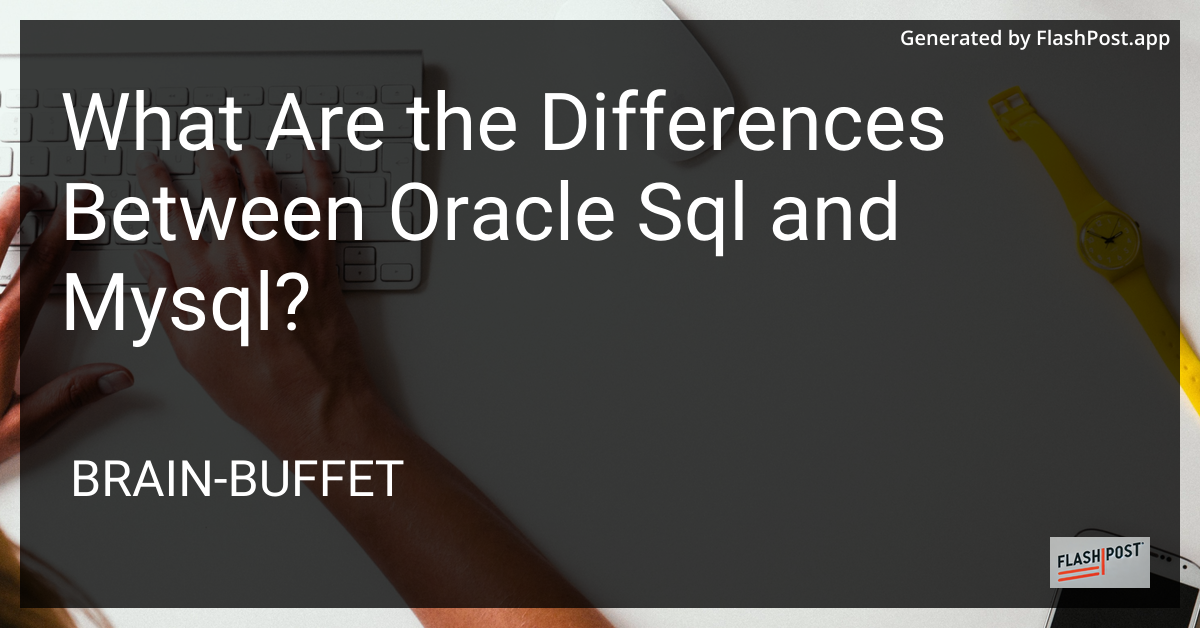What Are the Differences Between Oracle Sql and Mysql?

When it comes to managing databases, two of the most popular SQL databases are Oracle SQL and MySQL. Both have their own unique features and capabilities that cater to different needs and use cases. In this article, we will explore the key differences between these two powerful database management systems.
Overview of Oracle SQL
Oracle SQL is a highly robust and versatile relational database management system (RDBMS) developed by Oracle Corporation. It is renowned for its scalability, reliability, and extensive features that are well-suited for large enterprises and complex applications.
For more information on Oracle SQL, take a look at this resource.
Overview of MySQL
MySQL is an open-source RDBMS that is widely used for web applications and online publishing. It is managed by Oracle Corporation but is distinct in its ease of use, speed, and seamless integration with web technologies. MySQL is a popular choice for small to medium-sized businesses due to its simplicity and performance.
Key Differences
1. Licensing and Cost
Oracle SQL: Oracle SQL is a commercial product that requires licensing fees. It offers advanced features and premium support, which can be costly but provides value for large-scale and mission-critical applications.
MySQL: MySQL is open-source and free to use under the GNU General Public License (GPL). It offers paid support and additional features through MySQL Enterprise Edition.
2. Performance and Scalability
Oracle SQL: Known for its superior performance, Oracle SQL is designed to handle high transaction volumes and extensive data workloads. It excels in environments that require significant data processing and multiple concurrent operations.
MySQL: While MySQL performs well in typical web applications with moderate data loads, it may not match Oracle SQL's performance in high-volume transaction environments. However, its lightweight architecture makes it ideal for simple database operations.
3. Features and Capabilities
Oracle SQL: Offers a rich set of features including complex queries, advanced data types, and robust security mechanisms. Oracle's extensive functionality supports in-depth data analysis and business intelligence tasks.
MySQL: Provides essential features for typical database operations, with support for triggers, views, and stored procedures. Its feature set is not as extensive as Oracle SQL, but it is sufficient for most web-based applications.
If you're interested in exploring advanced SQL functions like REGEXP_SUBSTR, you can find more details here.
4. Community and Support
Oracle SQL: Heavily reliant on official paid support channels, with a significant amount of professional documentation and resources available for users.
MySQL: Benefits from a large community of developers and an abundance of online resources, forums, and user-contributed content that offer support and solutions.
5. Use Cases
Oracle SQL: Suitable for enterprise-level applications where data integrity, security, and compliance are critical. Commonly used in financial services, telecommunications, and government sectors.
MySQL: Ideal for web applications, content management systems (CMS), and small-scale applications where quick deployment and ease of use are priorities.
For more insights into practical applications, such as retrieving system dates, check this detailed guide on Oracle SQL date functions.
Conclusion
Choosing between Oracle SQL and MySQL depends largely on your specific requirements and project scale. While Oracle SQL offers comprehensive features suitable for complex and large-scale applications, MySQL provides a cost-effective, user-friendly solution for web-based applications. Both have their own strengths, making them valuable tools in the relational database ecosystem.
For more about Oracle SQL and its functionalities, you may refer to this page.